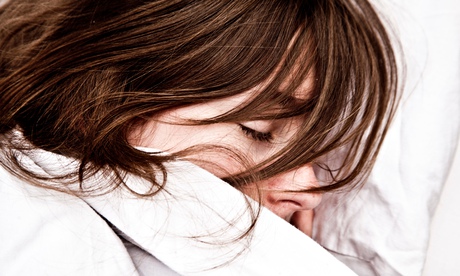
In your 20s it's more acceptable to leave a party because you want to eat a kebab rather than because you want to go to bed. In fact, it's better to be leaving a party to steal your neighbour's Amazon deliveries than to admit to being too tired to stay out. Because going to bed early is our last great social taboo. I should know. I do it all the time.
This week, the University of Oxford and the online CBT programme Sleepio launched the Great British Sleep survey, the largest ever study of the nation's slumber. The findings will be used to aid research into sleep science and to raise awareness about the importance of what Edgar Allen Poe called "those little slices of death". And it is indeed a form of social death to go to bed before midnight when you're young.
Which is mad. As Prof Russell Foster, head of the Sleep and Circadian Neuroscience Institute at the University of Oxford, said: "Sleep is the single most important health behaviour we have. It affects everything from our day-to-day functioning to our long-term physical and mental health." In short, too many late nights is terrible for you.
And yet, staying up all night to get lucky is still considered the epitome of cool. Never mind the fact that neuroscientists like Dr Louis Ptacek at the University of California have long argued that circadian rhythms are, to some extent at least, determined by our genes. Through his study of familial advanced sleep phase syndrome Ptacek discovered a gene that appears to override the effects of daylight on sleep patterns. His research also pointed towards the thousands of nerve cells in the suprachiasmatic nucleus, a region in the hypothalamus, that controls when we get tired and when we wake up. Thanks to our brain chemistry and hormonal makeup some of us are simply born larks, not owls.
Meet a fellow lark and you have a friend for years. They will not only understand your sneaking off, they will admire and aspire to it. They will want to go swimming before work, have dinner when you're hungry, understand your love of pyjamas and respect you when you say you're going home.
However, as anyone who has ever met the rolled eyes, disparaging grimaces and patronising tuts of unsympathetic friends can tell you, wanting to go to bed before closing time is all too often a one-way ticket to condescension, cancelled invitations and pariahdom. I, for example, appear to have inherited my mother's primary school teacher circadian rhythm. I am ready for bed at 9pm and wide awake by 5.30am. Which would be great were I a school teacher. Except I'm not.
And so we lie. We stifle yawns, drink thick coffee and pretend that we wouldn't really rather be in bed at all. Because while you can admit to not drinking, not smoking, not eating meat and to taking all your holidays in British caravan parks without risking anything worse than genuine interest and admiration, admit that you're leaving a party so you can be in bed by 10pm and you will be ridiculed, if not shunned.
Getting an early night may be the oldest code in the book for having sex. But, believe me, in your 20s there is nothing remotely sexy about wanting to go to bed before the witching hour. And that's just fine. Because, frankly, I'd rather wake up happy, bright-eyed and clear-headed. To have time to run through marshes with rabbits, to eat breakfast, to water my flowers and to read the paper before slipping off, refreshed, to work.
I love mornings. I don't miss midnight.

